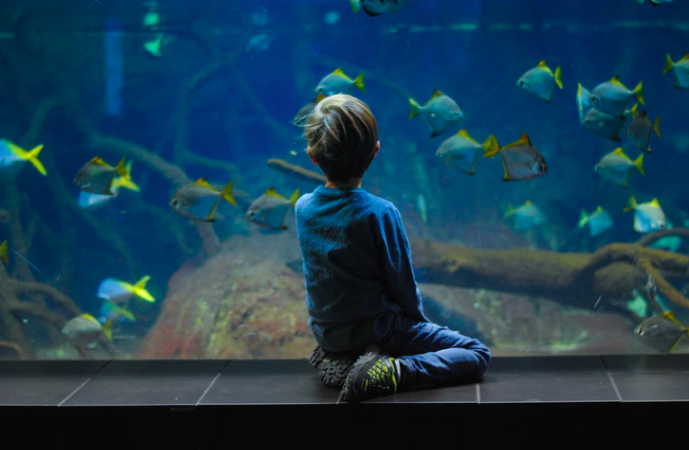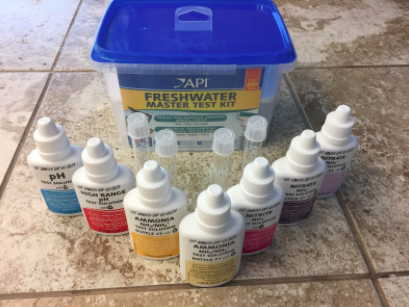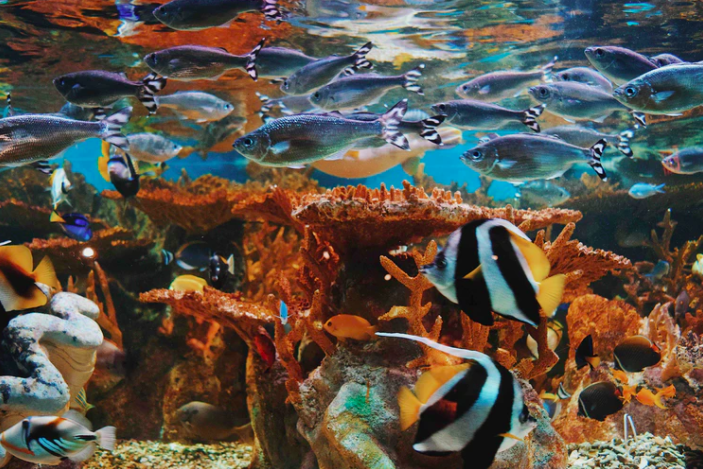Tim Kerrigan is a blogger with a passion for aquariums and fishkeeping. His aim is to educate and inspire others to pursue this hobby in a responsible manner.
1. Numerous Health Benefits

Lively, beautifully colored fish are a joy to watch in an aquarium. Many people find themselves transfixed, and for good reason. Scientific studies have shown there are a variety of health benefits attained by this simple act of focusing on such a display.
- Lowered Blood Pressure and Heart rate
Cardiovascular disease is a leading cause of death in the modern world. It should go without saying then, that anything that lowers our blood pressure and heart rate is a good thing.
A reduction in blood pressure and heart rate is exactly what this study found when monitoring its participants. Moreover, it found that the greater the number of aquatic organisms the greater the reduction in heart rate and blood pressure.
- Stress Reduction
Everyone needs positive outlets for stress reduction in this chaotic world and a home aquarium can provide that. The reduction in blood pressure and heart rate seen in the above study also corresponded with an improvement in mood and stress reduction.
This is one reason that so many health care and dental offices have a large aquarium on display. These serve to refocus your attention and calm your anxiety.
- Decrease In Pain Perception
Remarkably the benefit of having an aquarium in a health care setting goes beyond stress and anxiety reduction. Another study found that there was a statistically significant reduction in felt pain among participants. This occurred after as little as 5 minutes of aquarium viewing.
While this effect is somewhat short-lived it is a great way for patients to feel less pain during simple procedures without the use of pharmaceuticals.
- Calming Effect On Children
As with studies involving adults, aquariums can have a huge calming effect on children. While this is good news for any parent, it is especially useful for parents of children with hyperactivity or ADHD.
Aquariums may even improve concentration and sleep in children. These benefits may carry over to improved performance in school and behaviour at home.
2. Fish are well behaved

Any seasoned dog or cat owner knows that there can be drawbacks. Many dog owners will be familiar with barking, chewing and hole digging. While cat owners have to deal with occasional hairballs and ammonia laden litter boxes.
But our finned friends on the other hand won’t present any such problems. The loudest noise you will hear is a water filter cycling and any mess they create is limited to their tank. I have also never heard a fish owner complain about the difficulty of obedience training!
I’m not saying that there aren’t any negatives to owning fish because there are some. It’s just that those negatives are much more isolated and smaller in scale.
3. They require very little space
Nearly everyone can find enough room for a small aquarium in their living space or office. From bookshelves to desktops there are lots of aesthetically pleasing options.
A small 25 liter aquarium has a footprint of just 35 x 43 cm, and even larger 365 liter aquariums have a very manageable footprint of 120 x 60 cm.
I do need to mention that the larger aquariums can be quite heavy when filled with water. So make sure that whatever you place the tank on can support the weight. More on this later.
4. They make great first pets for kids
For younger children a dog or a cat may be too great a responsibility, while a small fish tank is a very manageable alternative to giving them their first pet. With a little supervision they can be taught to feed and look after their new finned friend.
Caring for another life can have a long lasting positive impact. This will not only teach the child responsibility but will also foster an interest in animals and the natural world around them.
5 They can be left at home alone
Another benefit over other pets is fish can be left home alone without issue. They won’t experience separation anxiety or destroy your home while you’re away.
Most fish can go 2-3 days without food and not suffer any adverse health impacts. But if you are going to be gone for longer, you will need to plan for this. Get a friend, relative or trusted neighbour to check in on them, or you can use an automatic feeder like I do.
Getting Started With An Aquarium..
If aquariums can have all of these health benefits where does one get started? For total beginners it’s best to keep things simple and manageable. That’s why I highly suggest a freshwater aquarium, to begin with. Saltwater and brackish aquariums are great but are far more expensive and complex.
Selecting Fish and Other Inhabitants
There are many freshwater fish species to choose from in a wide variety of shapes, sizes, and colors. Furthermore, there are even other non-fish pets as well such as shrimp, snails, and frogs.
Spend some time doing research to determine what types of fish you are interested in keeping. Take note of aquarium requirements such as water temperature and space needs. Other things to consider are social disposition (schooling vs solitary) and compatibility with other fish species.
Great Beginner Fish Species
- Common Goldfish
- Betta Fish
- Platies
- Corydoras
- Barbs
- Angelfish
- Guppies
- Neon Tetra
- Swordtails
- Zebra Danios
Choosing A Tank
One of the first things you need to consider before purchasing a fish tank is where you will put it. Many people don’t consider how much a filled fish tank weighs. For instance, 1 liter of water weighs 1 kilogram, therefore a moderately sized 125-liter aquarium holds 125 kg of water.
Tanks of 60 liters or less will generally be fine on any sturdy piece of furniture with a hard flat surface. With larger tanks, it’s best to buy an aquarium cabinet designed for that size tank.
In addition to thinking about what you will place the tank on you need to consider where in your home it will be placed. Avoid high traffic areas where there is a potential to bump, jostle, or otherwise damage the tank. Make sure it is close enough to a power outlet to support the required electrical equipment.
Setting Up The Aquarium…
In addition to the fish tank itself, you will also need equipment and decor. Make sure you thoroughly wash and rinse all of your equipment and decor before adding them to the tank. This removes any harmful residues that may be leftover from the factory.
Equipment
As far as equipment is concerned you will first need some type of filter. These function to remove waste products from the water. If you have a small tank you can opt for a simple sponge or “hang on back” style filter. Larger tanks may need a more expensive external canister filter.
Are the fish you selected coldwater or tropical fish? Coldwater fish, like goldfish, will not need a heater if housed indoors. Most aquarium fish, however, are tropical fish and will need a heater to maintain a temperature around 22-25.5°C.
Lights are not absolutely necessary for the health of the fish but will be needed if you have live plants. Plants aside, lights add a certain radiance and make the tank a clear focal point in any room. This is why I recommend them for nearly any aquarium. They are available in multiple color spectrums and can even be programmed to turn on/off at designated times.
An air pump with an air stone is also recommended in many cases. This will add extra dissolved oxygen into the water for your fish to breathe. Some filters like a sponge filter or under gravel filter will already create bubbles so an air stone isn’t needed.
Decor
I have to admit, choosing the tank decor is one of my most favourite things when setting up a new aquarium.
There is a vast array of decor to choose from. The best way to approach this is to select your substrate first. This can be anything from natural gravel, painted gravel, stones, and even marbles.
Once you have the substrate selected you can choose plants and decorations that compliment your substrate. As far as plants are concerned I recommend artificial plants for beginners. Live plants add another level of complexity and can prove difficult when starting out.
Water Chemistry

Now that we have our tank, equipment, and decor we can add water and drop the fish right in, correct? Not so fast, there are some things you need to know about the water chemistry in an aquarium first.
Dechlorination
That tap water you are about to add is likely from a municipal water supply and is chlorinated. Chlorine is added to water in order to disinfect and kill bacteria. Unfortunately, it can also poison your precious new fish!
The remedy to this is to always add a water conditioner which dechlorinates the water making it safe for your fish.
Cycling Your New Aquarium
Can we add our fish now? Not just yet. There’s a little something called the nitrogen cycle you should know about first.
The nitrogen cycle refers to a process by which the harmful ammonia secreted by your fish is converted into the more benign nitrate.This process is performed by beneficial bacteria which take time to colonize the tank.
Adding all of your fish at once will likely spike the ammonia levels in your tank before these bacteria have a chance to colonize. This will sicken and even kill your fish.
There are a couple of ways to ensure your tank is fully cycled before adding all of your fish. These two ways are generally known as “fish in” and “fishless” cycling. The first involves slowly adding fish and the other treats the tank with ammonia before adding fish.
While this is too in depth to fully explain here you can check out this complete nitrogen cycle article for more information.
Maintenance
Your tank should now be properly cycled and your fish are settled in. To maintain a healthy aquarium you will need to do partial water changes once every couple of weeks. This will keep the nitrate at healthy levels. This is also a good time to do a little cleaning and maybe vacuum the gravel.
What Are You Waiting For?
I hope I have convinced you to give this great hobby a go. I know I have achieved a lot of personal satisfaction and enjoyment in my fish keeping journey and I know that you can too.
Looking for a pet or need some supplies?






